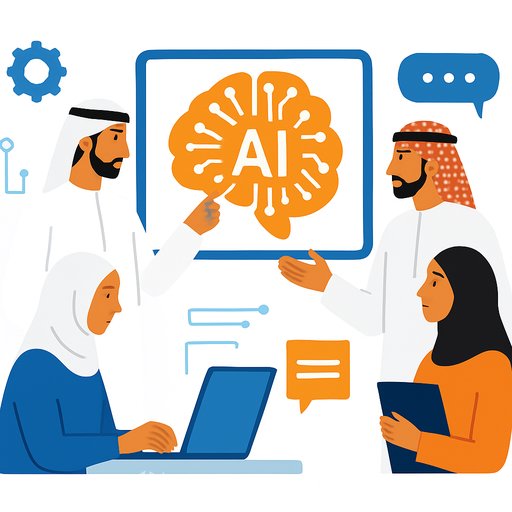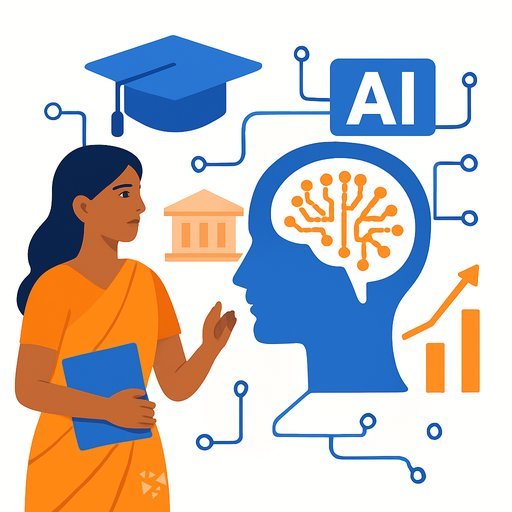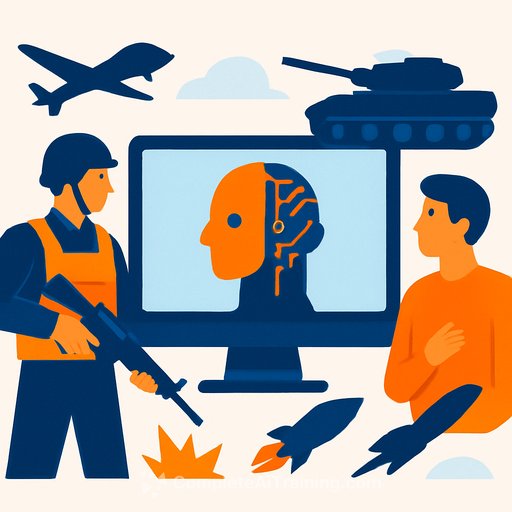Gulf Countries Back Arabic AI for Education: What It Means for EdTech, IT, and Developers
GCC member states have agreed to collaborate on Arabic-first AI for education. The decision came out of the 24th Meeting of the e-Learning Official Committee, hosted by Saudi Arabia's National Center for e-Learning on November 6, 2025.
The agenda focused on shared strategy, governance in education, and practical rollouts. Participants moved to adopt an AI reference model proposed by the National Center for e-Learning and discussed a unified Gulf language model to support online learning and higher education.
Key outcomes from the meeting
- Adoption of an AI reference model for education to standardize governance, risk controls, and deployment practices across GCC institutions.
- Proposal to develop a unified Arabic Gulf language model for learning systems, higher education use cases, and platform integration.
- Commitment to exchange expertise across ministries, universities, and e-learning leaders to speed up digital transformation in education.
- Emphasis on policy frameworks that enable responsible use of modern technology in teaching, assessment, and student support.
Why a unified Arabic model matters
An Arabic-first model improves accuracy, context, and relevance across curricula and student services. It can better handle regional terminology, cultural nuances, and mixed Arabic-English learning materials common in Gulf classrooms.
Expect gains in content generation, tutoring, assessment feedback, and accessibility (speech, OCR, and dialect awareness). Just as important, a shared model reduces duplicated spend and simplifies benchmarking across institutions.
Implications for education leaders
- Set a clear AI adoption roadmap: where to use AI (student support, content, assessment), what to avoid, and how to measure learning impact.
- Procurement: prepare vendor requirements for Arabic capability, data privacy, interoperability, and explainability.
- Governance: define model usage policies, human oversight, audit trails, and incident response for misuse or bias.
- Curriculum readiness: update policies for AI-assisted work, academic integrity, and assessment design.
- Faculty and staff enablement: offer training on prompt quality, classroom use cases, and evaluation of AI outputs.
What IT and developer teams should prepare
- Integration: plan APIs for LLM services, RAG pipelines using Arabic corpora, and connectors to LMS/LXP and SIS.
- Standards: support LTI 1.3, xAPI/cmi5, and single sign-on to keep AI tools consistent with existing platforms.
- Evaluation: use Arabic-specific benchmarks for quality, toxicity, bias, and hallucination rates; track drift over time.
- Data controls: implement data minimization, consent flows, PII masking, and regional data residency where required.
- Compute and cost: capacity planning for GPUs/accelerators, caching, and prompt optimization to control spend.
- Observability: logging, feedback loops, and model cards so academic leaders can audit usage and outcomes.
Governance and responsible use
The committee underscored governance in education as a priority. That means clear rules for AI-assisted learning, strong privacy protections, transparent grading support, and fairness checks across dialects and demographics.
Practical steps: mandate human-in-the-loop for high-stakes decisions, keep versioned prompts/policies, and run periodic bias and safety evaluations.
Who was in the room
Directors of education across the GCC, deans, and e-learning leaders from higher education attended, along with experts in digital education and AI. They reviewed experiences from Saudi Arabia and other Gulf universities and discussed regulation and policy frameworks that encourage responsible technology use.
What to watch next
- Publication of the AI reference model and implementation guide for GCC institutions.
- Technical roadmap for the unified Gulf language model, including data sources and evaluation plans.
- Pilot programs in higher education (tutoring, content generation, accessibility, and assessment support).
- Interoperability requirements for LMS/LXP vendors and procurement guidelines for ministries and universities.
- Faculty development programs and certification pathways for AI-enabled teaching.
For official updates, check the GCC Secretariat and Saudi Arabia's National eLearning Center.
If you're planning staff training or curriculum upgrades around AI, see role-based options at Complete AI Training.
Your membership also unlocks:









